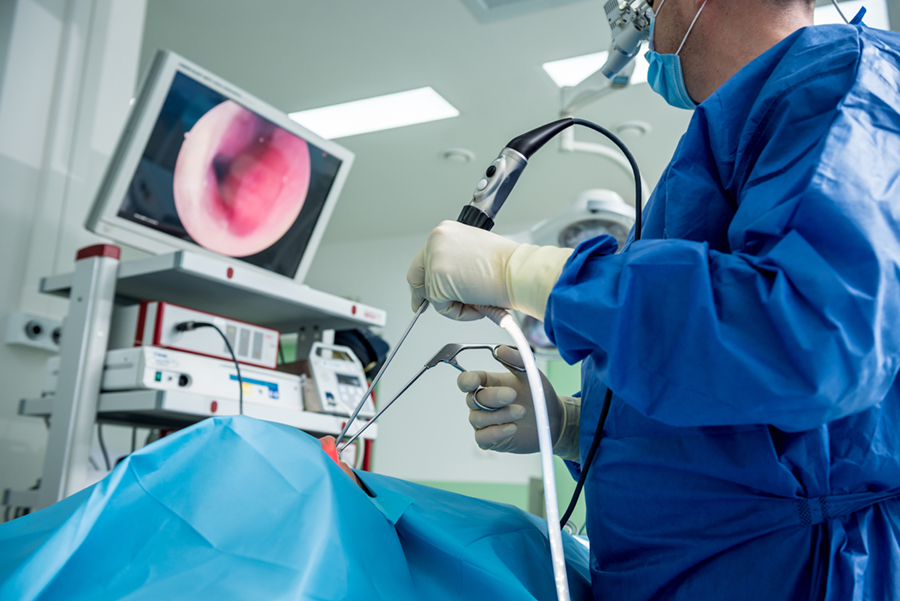Get Relief from Your Nasal Problems
Nasal endoscopy is a procedure that allows our team to evaluate complaints such as nasal blockages, nosebleeds, headaches, facial pain, and more. Southern Indiana ENT offers nasal endoscopy for our patients in Columbus, IN. Many times a nasal endoscopy procedure is necessary to help you get the relief you need. A nasal endoscopy diagnostic is a simple procedure that allows us to give an accurate diagnosis and help you find relief from your sinus problems. Learn more about what nasal endoscopy is, why you might need it, how to prepare for the procedure, and more. Get in touch with us today to schedule an appointment.
What is a Nasal Endoscopy?

Understanding what a nasal endoscopy is can help you prepare for the procedure in the event you need it. This common procedure allows our physicians to inspect your nasal cavity using an endoscope. An endoscope is along, flexible tube. A lighted camera is attached to that tube so your doctor can clearly see your nasal cavity. This simple and minor procedure is performed during office visits. You will receive a numbing medicine and decongestant, so you are more comfortable during the procedure. A nasal endoscope will be used to examine your nasal cavities. These exams typically only take a minute or two. The nasal sinus endoscopy will help your doctor diagnose your condition.
Why Would You Need a Nasal Endoscopy?
There are several reasons why patients in Columbus may require a nasal endoscopy. This procedure shows your doctor specific details such as swelling or bleeding. Nasal endoscopy procedures can be used to look at growths to determine if cancer is present. Nasal endoscopy procedures can remove foreign objects from the nose of small children. A nasal endoscopy can be used to assess how your nose or sinus problem treatment is working. One of the most common reasons for requiring a nasal endoscopy is rhinosinusitis. Symptoms of rhinosinusitis include a nasal blockage, facial pain, and greenish or yellowish fluid coming from your nose. Sometimes a nasal endoscopy is used to perform minimally invasive surgery. Your healthcare provider may use an endoscopy to get more information about the following health problems:
- Nosebleeds
- Nasal tumors
- Cerebrospinal fluid leaks
- Loss of ability to smell
- Nasal blockages
- Nasal congestion
- Nasal polyps
- Nasal and sinus infection
Are There Any Risks of a Nasal Endoscopy?
A nasal endoscopy procedure is generally safe. Rare complications may include nosebleeds, fainting, or a harmful reaction to the anesthetic or decongestant. Your doctor will monitor you during and after the procedure. Your risk varies based on your age and other health conditions. Patients with bleeding disorders or who are on blood thinners may be at a greater risk for bleeding.
How to Prepare for Your Nasal Endoscopy
While a nasal endoscopy is a relatively short and simple procedure, there are some things you should do to prepare for your office visit. Ask your doctor if you should stop taking any of your medications, such as blood thinners. You can eat or drink normally before your procedure, and your doctor may give you more instructions. A topical decongestant will likely be sprayed into your nose just before your nasal endoscopy. The decongestant reduces swelling so that the endoscopy can pass through your sinuses and nasal cavity easier. Your nose will likely be sprayed with an anesthetic to numb the area briefly.
Nasal Endoscopy FAQ
Our patients often have questions about a nasal endoscopy procedure. We’ve prepared the answers to some questions we frequently receive for your benefit. Feel free to contact us if you have any other questions.
What happens during my nasal endoscopy?
During your consultation, you should ask your doctor what to expect during your nasal endoscopy procedure. We can give you a brief overview of what to expect. You will sit upright in an exam chair, and your nose will benumbed. The endoscope will be inserted into one nostril and pushed forward to view parts of your sinus and nasal cavities. This may be repeated on the same side of your nose before switching to the other side of your nose.
What happens after my nasal endoscopy?
You should also talk to your doctor about what you can expect after your nasal endoscopy. If you have your procedure in the office, you should be able to return home right away and resume your routine activities. Be sure to let your doctor know if you experience a nosebleed that won’t go away. Your provider should follow up with your diagnosis and treatment plan.
Schedule Your Appointment Today
Southern Indiana ENT can help you get relief from your sinus pain. Our fantastic team is caring and compassionate, and we have three locations to serve you best. During your consultation, you’ll find out whether you require a nasal endoscopy. Contact us today to schedule an appointment.

